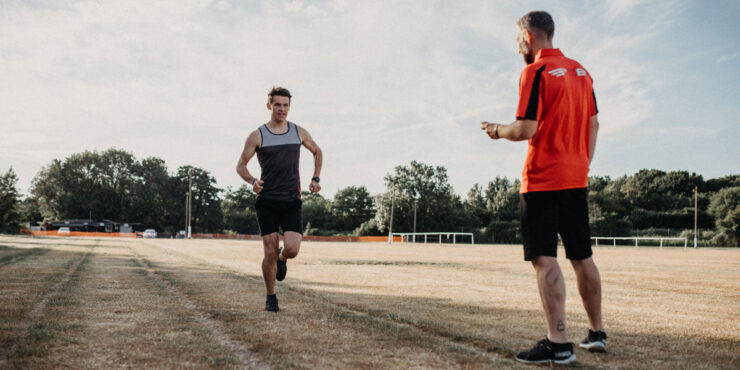Becoming a certified running coach is an exciting career path for those who are passionate about running and helping others improve their fitness and performance. Whether you’re an experienced runner or just someone who loves the sport, guiding others toward their running goals can be incredibly rewarding.
Certification not only enhances your credibility but also equips you with the knowledge and skills to create effective training programs, prevent injuries, and motivate your clients. In this step-by-step guide, we’ll walk you through everything you need to know to become a certified running coach and set yourself up for success in this dynamic field.
Choose the right certification program

When choosing a program, it’s crucial to evaluate several key factors to ensure it aligns with your goals and experience. Start by researching the program’s reputation, as a well-regarded certification can enhance your credibility and future opportunities. Look at the range of topics the program covers, such as training methodologies, injury prevention, or sports nutrition, to ensure it provides comprehensive knowledge.
Also, consider whether the program requires a certain level of prior experience or background in running or coaching, as some certifications are tailored for beginners, while others are designed for more seasoned professionals. Making an informed decision will set the foundation for your coaching career.
The first step in becoming a certified running coach is selecting the right certification program. There are several organizations that offer running coach certifications, gait analysis, nutritional strategies, and one such is https://www.americansportandfitness.com/products/running-coach-certification.
Understand the certification requirements
Once you’ve chosen a certification program, the next step is to understand its specific requirements. Most running coach certifications require you to complete coursework, pass an exam, and meet practical experience requirements. Some programs may also require prerequisites, such as prior coaching experience or a general fitness certification.
Be sure to review the details of your chosen certification carefully to ensure you meet all the necessary qualifications. Many certification programs offer a mix of in-person and online courses, allowing you to complete the coursework at your own pace. Depending on the program, it can take anywhere from a few weeks to several months to complete the certification process.
Study running mechanics and physiology

One of the most important aspects of becoming a successful running coach is having a deep understanding of running mechanics and human physiology. Certification programs will typically cover these topics in detail, but it’s essential to dedicate time to study them on your own as well. Knowing how the body moves during running, the role of different muscles, and the impact of proper form on performance and injury prevention is crucial for creating effective training plans.
Understanding the biomechanics of running allows you to identify common form issues, such as overstriding or poor posture, and correct them to improve efficiency and reduce the risk of injury. Additionally, learning about energy systems, aerobic and anaerobic thresholds, and recovery strategies will help you design training programs that are tailored to each runner’s fitness level and goals.
Gain practical experience
While certification provides the theoretical knowledge needed to become a running coach, practical experience is equally important. Working with runners in real-life situations allows you to apply what you’ve learned and develop your coaching style. Whether you’re helping a beginner prepare for their first 5K or working with an experienced marathoner aiming for a personal best, hands-on experience will build your confidence and skills.
Consider volunteering with local running clubs, youth programs, or charity races to gain experience. Many running coach certification programs also offer mentorship opportunities, where you can learn from experienced coaches and gain insights into how they manage training plans, client relationships, and race day preparations.
Learn how to create personalized training plans
As a running coach, one of your primary responsibilities will be creating personalized training plans for your clients. Each runner is unique, with different goals, fitness levels, and limitations. Therefore, it’s essential to learn how to assess a runner’s current ability and design a program that suits their needs. Certification programs will teach you the basics of periodization, how to structure workouts, and how to balance intensity and recovery.
When creating a training plan, you’ll need to consider factors like the runner’s goal (e.g., improving speed, building endurance, or completing a race), their current fitness level, and any past injuries. You’ll also need to know how to adjust the plan as the runner progresses, ensuring they stay motivated and avoid burnout or injury.
Focus on injury prevention and recovery
Injury prevention is a crucial part of being a running coach, especially since runners are prone to overuse injuries like shin splints, plantar fasciitis, and IT band syndrome. To become a well-rounded coach, it’s essential to understand common running injuries and how to prevent them through proper training techniques, strength exercises, and recovery protocols.
Part of your role as a coach will be educating runners about the importance of stretching, mobility work, and cross-training to prevent injuries. Additionally, you’ll need to know when to advise a runner to back off from training or seek medical advice if an injury occurs. Your knowledge of injury prevention and recovery will help keep your runners healthy and motivated throughout their training journey.
Build strong communication and motivation skills

Coaching is about more than just creating training plans—it’s also about building relationships with your clients and keeping them motivated. As a running coach, you’ll need strong communication skills to provide clear instructions, give feedback, and offer encouragement. Understanding how to motivate your clients, especially during difficult phases of their training, is vital for their success.
Part of being an effective coach is knowing how to adjust your communication style based on each runner’s personality and needs. Some runners thrive on detailed data and feedback, while others may need more emotional support and encouragement. Building trust with your clients and keeping them engaged throughout their training is key to long-term success as a coach.
Becoming a certified running coach requires a combination of education, practical experience, and a deep passion for the sport. Focusing on injury prevention, effective communication, and motivating your clients will ensure that you not only help them reach their goals but also foster a positive and supportive coaching environment. With dedication and the right mindset, you can make a lasting impact on the lives of runners at all levels.
